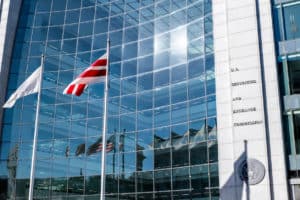 Last year, the Securities and Exchange Commission (SEC) revealed that it was going to allow its no-action letter to the Securities Industry and Financial Markets Association (SIFMA), based on enforcements surrounding research services, to expire on 3 July 2023.
Last year, the Securities and Exchange Commission (SEC) revealed that it was going to allow its no-action letter to the Securities Industry and Financial Markets Association (SIFMA), based on enforcements surrounding research services, to expire on 3 July 2023.
In its 2017 no-action letter to SIFMA, the SEC advised that it would not recommend enforcement action to broker-dealers accepting cash payments for research from investment managers which are required by Mifid II to pay for research from its own money as opposed to client commissions or ‘soft dollars’. It was originally due to expire on 3 July 2020.
“This letter was issued to allow time for the division and the industry to address questions about how broker-dealers would be able to receive compensation for research services after Mifid II went into effect,” said William Birdthistle, director, division of investment management at the SEC.
“Although the staff extended the temporary position through the summer [of 2023] the letter was not intended to be a permanent solution to the issue.”
The decision to let the no-action letter expire would potentially destabilise research arrangements between broker-dealers and investment managers that have been structured to comply with Mifid II. This is particularly relevant because many broker-dealers are still accepting cash or ‘hard dollar’ payments for research under the no-action letter.
Currently, Wall Street lobbyist are gearing up for an extension of the SEC’s no action, however, if the regulator succumbs their pressure, public pension plans, endowments and Americans invested in mutual funds are expected to lose out.
The way things currently stand, investment funds in the US are often forced to accept a bundle commission consisting of two components, one attributed to trading and another to research services. However, over the years trading has become much more automated, resulting in the cost of executing trades to fall.
Bundled commissions may require investors to accept subpar execution services in exchange for access to crucial sell-side research, raising overall trading costs. Bundled commissions also enable asset managers, such as mutual fund sponsors, to transfer operating costs to retail clients.
The SEC has tried to combat this by prohibiting bundled commissions altogether, but major sell-side firms have resisted reforms.
“If the industry now has many ways to accept cash payments from Mifid II clients for research, why are they so intent on getting their temporary no-action relief extended yet again? The answer is that they want to continue forcing US investors to pay bundled commissions as long as possible. The industry is fighting a rearguard action so that they can continue to exploit US investors as long as possible,” said Howell E. Jackson, professor of law at Harvard Law School and Tyler Gellasch, president and CEO of the Healthy Markets Association.
In an article posted by Jackson and Gellasch, Equal Treatment for US Investors, the pair argued that the SEC’s no-action letter discriminated against US investors, given that the letter only applied to clients subject to Mifid II by law or contract.
The SEC’s no-action letter did not allow securities firms to accept cash payments for research from the majority of US investors, meaning they were still paying the cost of bundled research without necessarily knowing how much was being attributed to research and whether that research was benefitting them at all. Jackson and Gellasch also highlighted that in many cases, several asset managers are being compelled to trade with a few brokers to obtain their research, even if they don’t want to trade with those brokers.
With the expiration of the SEC’s no-action letter, all clients will be on the same footing, with US investors finally able to reap the benefits of research cost transparency and the freedom of broker selection that European investors have achieved through Mifid II.
“While there are several other steps that the Commission could and should take to improve the transparency of soft dollar payments in the United States, a first and essential step is to let its 2017 no-action relief expire this summer as planned. Equal treatment of all investors, foreign and domestic, should be a platform on which we can all agree,” concluded Jackson and Gellasch.